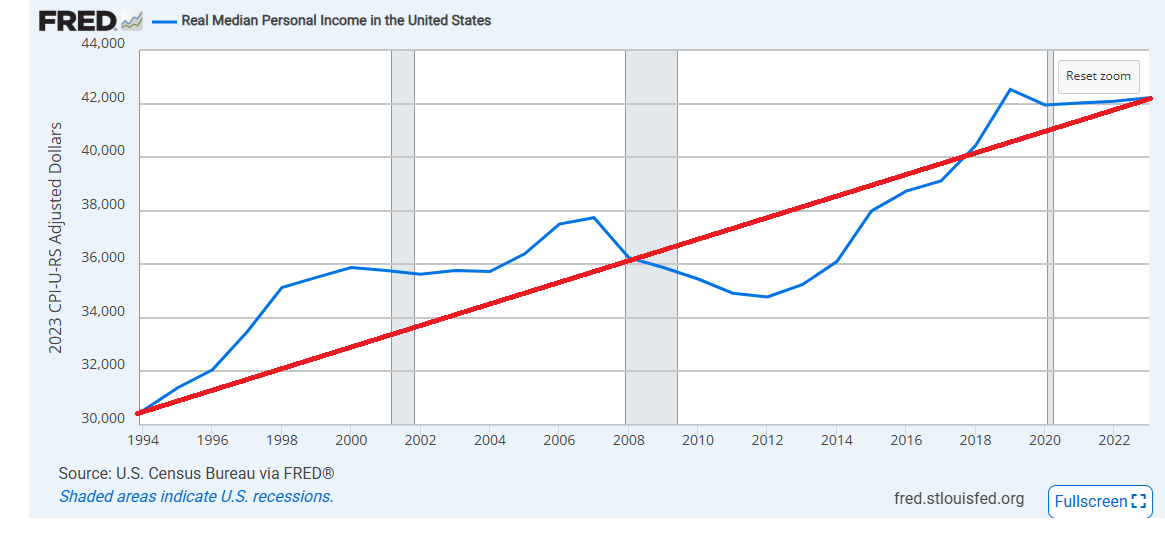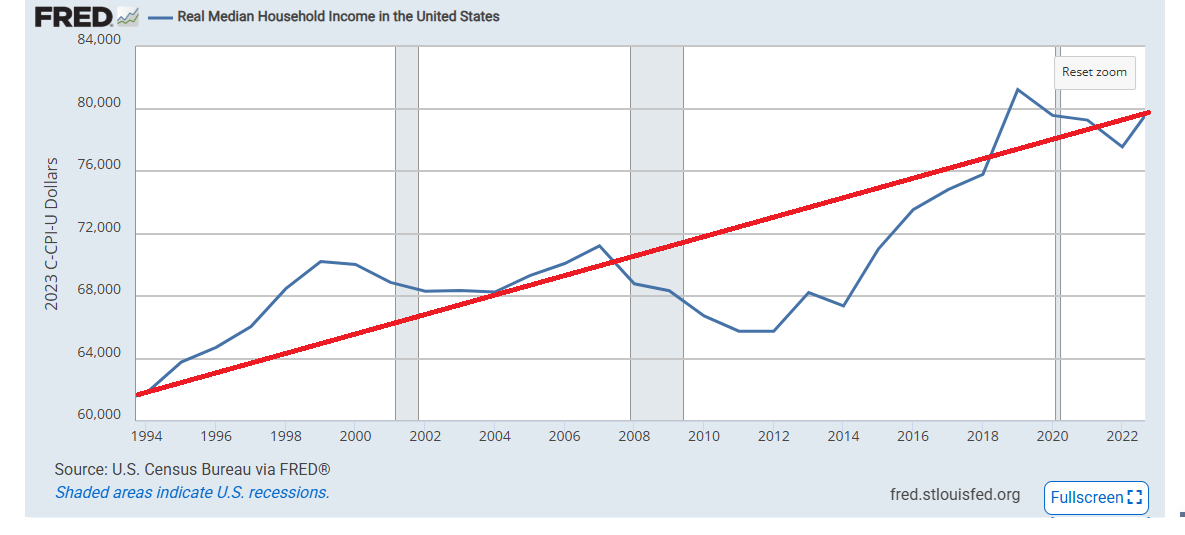President Donald Trump took a positive step on Wednesday by introducing a 90-day pause on higher-rate tariffs. Instead, all nations except China will now face 10% tariffs, and China will face 125% tariffs.
Even if Trump’s announcement is positive, however, it is far from ideal. As illustrated by the market chaos, broken retirement accounts, and impending supply chain shocks caused by Trump’s far higher tariff announcements last week, generic tariffs are a very poor servant of economic interest. On the contrary, the vast majority of Americans have benefited greatly from an economic policy centered around free trade. This reality is vested in obvious facts.
As shown in the Federal Reserve Bank of St. Louis charts below (my red line annotations), real median personal incomes increased by 38.2% between the 1994 introduction of the NAFTA free trade treaty and 2023. Real median household incomes increased by 30.4% in that same period. Have some suffered from free trade? Yes. Should much more have been done to support re-training programs and boost technical skills training more generally? Yes. Should technical and trade skills training take on a much greater position of importance in our education systems? Yes.
But has free trade been good for America? Yes. The examples abound further down the data trail. Due to import competition with domestic producers, for example, household appliances are also substantially cheaper compared to 1994 when prices are adjusted for inflation. These appliances, as well as just about everything else we buy, are also of a much higher quality than in 1994, precisely due to increased competition and the associated need for innovation.
The point bears emphasizing: tariffs destroy competition and thus also the ability of Americans to pick from a greater array of more variably priced products for that which suits them best. Those who support scaled global tariffs should have the courage to admit their inherent belief that they know what’s better for Americans than Americans know for themselves. Put another way, they should state plainly, “I’m from the I-know-better-than-you-what’s-good-for-you crowd, and I’m here to help.”


The point here is not that America should always adopt free trade practices regardless of what others are doing. The Trump Administration should respond vigorously to the European Union’s protectionist extortion targeting U.S. technology giants, for example. The U.S. should also be willing to leverage tariffs where a trading partner is engaged in significant market distortions.
China stands out here.
Responding to its theft of hundreds of billions of dollars of U.S. intellectual property every year, its threats to American partners and allies, and its aggressive efforts to replace the U.S.-led democratic international order with an order of Chinese Communist Party-led feudal mercantilism, China deserves the tariffs it is now receiving. There will be U.S. market disruptions, some challenging, but China poses the most exceptional threat to America and the international community since that posed by the Axis Powers in 1941. We should buy from Vietnam and India what we currently buy from China. The people of those countries like America and their governments fear China’s regional imperialism.
Still, China is an exceptional case both in terms of its threat and the deserved high tariffs imposed upon it.
More broadly, free trade has manifestly served the vast majority of Americans and the vast majority of people globally. Those conservatives who crave a return to protectionism must hide from this reality or invent thin intellectual veils for its existence. They also ignore the fact that while many Americans wish to work and indeed deserve greater government support in gaining the skills to pursue work, many others are self-isolated from the economy and have no intention of “getting on their bikes.”
In turn, rather than encourage tariffs that hurt the majority of Americans (the poorest the most), conservatives should encourage reforms to address the core drivers of living costs. These include inflationary health care, utterly unsustainable entitlement costs, and government regulations and spending that introduces friction to free enterprise while driving up the debt. Conservatives should also support government reallocation of some college funding to technical skills programs that prioritize the most economically deprived areas. This is the better pathway to improve a more broadly shared national prosperity and rebuild a high-value industrial base (especially important for national defense needs). But making Block V Virginia-class attack submarines is not the same thing as making T-shirts.
TRUMP’S TARIFFS ARE TRAMPLING ALLIANCES AGAINST CHINA
The basic truth?
Americans won’t be secure, prosperous, or happy if China achieves global supremacy. But neither will They be secure, prosperous, or happy if we use tariffs to drive up import costs and encourage our citizens to make T-shirts, Pens, and Refrigerators. That is the pathway to higher costs for the many, fewer choices among poorer-quality products, and a correspondingly reduced means of pursuing happiness.
America is going to be successful by corralling the Chinese Communist Party until it reforms or dies, by embracing technological evolution, by encouraging a mix of classical and technical education, and by empowering the enduring centerpiece of the U.S. economy: its consumer economy.














